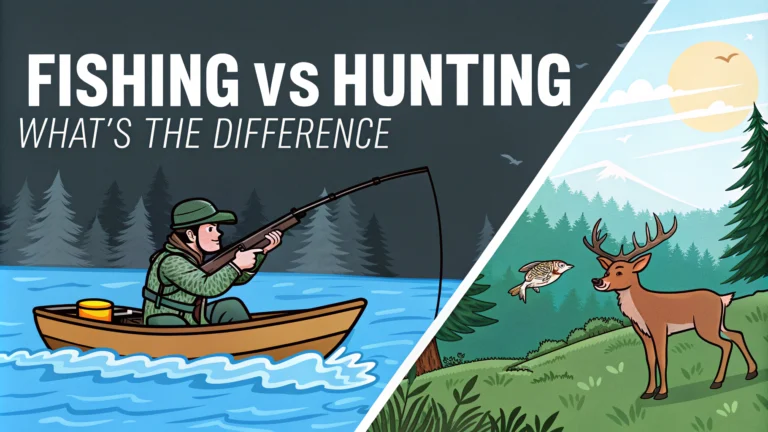Fishing and hunting rank among the oldest ways humans have gathered food, each with unique methods, tools, and skills. While both activities provide outdoor recreation and food sourcing, they differ significantly in their approach and requirements.
Each activity needs specific licenses, gear, and knowledge of local regulations. **Fishing** typically allows year-round practice with seasonal restrictions, while **hunting** often follows strict seasonal schedules and species-specific rules.
Essential Gear and Equipment
Fishing equipment focuses on:
- Basic rod and reel combinations
- Various lures and bait types
- Tackle boxes and storage
- Weather-appropriate clothing
Hunting requires:
- Firearms or archery equipment
- Safety gear and orange vests
- Scent control products
- Specialized camouflage
Skill Development and Training
**Fishing skills** build progressively through practice:
- Casting techniques
- Reading water conditions
- Understanding fish behavior
- Knot tying expertise
**Hunting skills** require formal training:
- Mandatory safety certification
- Tracking and stalking
- Shooting proficiency
- Animal behavior knowledge
Legal Requirements and Regulations
Compare basic requirements:
| Activity | License Type | Age Restrictions |
|---|---|---|
| Fishing | Annual/Daily | Usually None |
| Hunting | Species-Specific | Age Minimums Apply |
> “Check local regulations before starting either activity – rules vary by location and season.”
Environmental Impact and Responsibility
Both hunting and fishing require specific conservation awareness to protect natural resources. **Wildlife management** depends on regulated harvesting to maintain healthy populations.
Key environmental considerations for hunters and anglers:
- Practice catch and release when appropriate
- Remove all waste and equipment from sites
- Report violations to local authorities
- Support habitat preservation initiatives
Safety Protocols and Best Practices
**Safety equipment** requirements differ significantly between activities:
| Fishing Safety | Hunting Safety |
|---|---|
| Life jackets | Orange safety vest |
| First aid kit | Firearm locks |
| Weather radio | Tree stand harness |
Always inform others about your planned location and return time for both activities.
Cost Analysis and Investment
**Starting costs** vary between fishing and hunting:
Basic fishing setup:
- Rod and reel combo: $30-100
- Tackle box with basic lures: $25-50
- License fees: $15-50 annually
- Total initial investment: $70-200
Basic hunting setup:
- Entry-level firearm: $300-700
- Safety gear and clothing: $150-300
- License and training: $100-250
- Total initial investment: $550-1250
Making Your Choice
Consider these factors when deciding between fishing and hunting:
| Factor | Fishing | Hunting |
|---|---|---|
| Time commitment | Flexible | Seasonal |
| Learning curve | Moderate | Steep |
| Initial cost | Lower | Higher |
> “Start with the activity that aligns with your schedule, budget, and local opportunities. Many enthusiasts eventually pursue both sports.”
Fishing vs Hunting FAQs
Q: What are the main differences between fishing and hunting?
Fishing and hunting differ in several key aspects:
- Equipment: Fishing uses rods, reels, and lures; hunting uses firearms or bows
- Target: Fishing targets aquatic species; hunting focuses on land animals
- Environment: Fishing occurs in water bodies; hunting takes place in forests, fields, and mountains
- Licensing: Different permits and seasons apply to each activity
Q: Which is more expensive – fishing or hunting as a hobby?
Hunting typically has higher initial costs due to:
- Firearm or bow purchases ($300-$1000+)
- Safety equipment and clothing
- Licensing and tags
Basic fishing can start under $100 with a simple rod and tackle.
Q: What are the best seasons for fishing vs hunting?
Fishing seasons: Year-round in many areas, peak in spring and summer
Hunting seasons: Primarily fall and winter, varies by species and region
Q: Is fishing or hunting more beginner-friendly?
Fishing is generally more beginner-friendly because:
- Lower entry barriers
- Less complex safety requirements
- More forgiving learning curve
- Easier access to fishing locations
Q: What safety equipment is needed for fishing vs hunting?
| Fishing Safety Gear | Hunting Safety Gear |
|---|---|
| Life jacket | Hunter orange vest/clothing |
| First aid kit | First aid kit |
| Sun protection | Ear protection |
| Weather gear | Eye protection |
Q: Can you practice fishing and hunting sustainably?
Both activities can be sustainable through:
- Following catch and bag limits
- Respecting seasons and regulations
- Practicing catch-and-release (fishing)
- Using ethical hunting methods
- Supporting conservation efforts
Q: What licenses do I need for fishing vs hunting?
Requirements include:
- Fishing: Basic fishing license, sometimes species-specific permits
- Hunting: Hunter safety certification, general hunting license, species tags
Q: Which activity – fishing or hunting – provides more meat per successful trip?
Hunting typically yields more meat per successful outing:
- Deer: 30-60 pounds of meat
- Elk: 200+ pounds of meat
- Fish: 1-5 pounds typically per catch
Q: What are the physical demands of fishing compared to hunting?
Hunting generally requires:
- More stamina and strength
- Longer hiking distances
- Carrying heavy gear
Fishing can be less physically demanding, though boat fishing and surf casting can be strenuous.
Q: Which is better for teaching children – fishing or hunting?
Fishing often works better for children because:
- Lower age restrictions
- Simpler safety considerations
- More immediate action and rewards
- Less physical demands



















